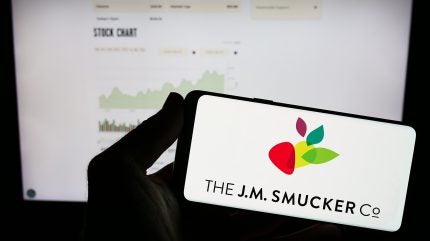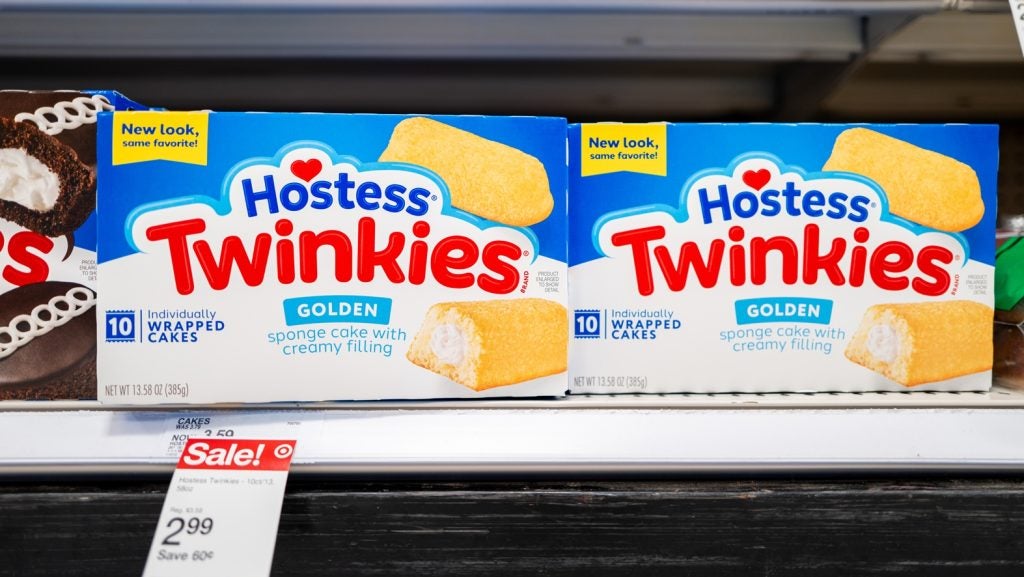
US manufacturer JM Smucker has faced significant questions in recent months, especially around its presence (and multi-billion-dollar investment) in sweet snacks.
The company’s eye-catching move for Twinkies owner Hostess Brands in 2023 divided opinion on Wall Street and it’s clear the $5.6bn deal has turned a little sour.

Discover B2B Marketing That Performs
Combine business intelligence and editorial excellence to reach engaged professionals across 36 leading media platforms.
Meanwhile, the recent spikes in coffee commodity prices have also meant the elasticity of the Folgers brand owner’s products is being watched closely.
This week, there was some positive news from JM Smucker, with an improved forecast for full-year sales after fiscal first-quarter results that beat management’s expectations.
However, the change was slight and there remains some concerns among analysts about the performance of the company’s sweet-snacks arm and the outlook for its coffee division, even after that side of the business saw sales rise 15%.
“Our first-quarter results exceeded our expectations and reflect the continued momentum of the business. Our teams demonstrated agility throughout the organisation, and though the external environment continues to be dynamic we are successfully managing what we can control,” CEO and chair Mark Smucker said.

US Tariffs are shifting - will you react or anticipate?
Don’t let policy changes catch you off guard. Stay proactive with real-time data and expert analysis.
By GlobalDataOverall, JM Smucker’s results showed some promise, with the company’s Uncrustables brand still a bright spot. More Uncrustables products were sold, boosted by new products, better distribution and marketing. “Consumers themselves are helping us propel the brand into a mainstream phenomenon,” Mr Smucker told analysts.
The company stuck to its annual forecast for earnings per share despite pressure on costs in the first quarter (although adjusted earnings per share was $1.90, a decrease of 22%. TD Cowen analyst Robert Moskow said the consensus forecast among analysts was for adjusted EPS to reach $1.93).
JM Smucker’s sweet-snacks struggles
However, the results also contained another quarter of falling sales from the group’s sweet-snacks business, with some analysts having doubts about the outlook for that side of JM Smucker’s portfolio.
The first-quarter results showed the net sales from its sweet-baked snacks division dropped 24% to $253.2m. Excluding the assets sold (to JTM Foods and Second Nature Brands, respectively), net sales fell 10%. Volume/mix declined 8%.
In June, JM Smucker said it would “narrow our priorities” for its sweet-snacks division after booking another set of impairments against the business.
The company recorded impairment charges of $980m made up of $867.3m linked to goodwill in the unit and a $112.7m impairment tied to the Hostess brand. JM Smucker recorded over $1bn in impairment charges for the same units in March.
Speaking to analysts this week, Mr Smucker outlined the ways in which the company is trying to revitalise its sweet-snacks business, including cutting SKUs by a quarter, closing a factory and setting up a dedicated sales force.
“Early signs reinforce that our strategy is working, as base velocities are improving and we have returned to share growth at several key customers,” he said.

Will demand for coffee stay strong?
Company-wide gross profit, meanwhile, fell 40% to $474.7m amid high commodity costs, “unfavourable volume/mix” and the impact of recent asset disposals.
Central to the jump in JM Smucker’s input costs were coffee commodity prices. The company’s US coffee division is its largest, accounting for around a third of the group’s $2.12bn first-quarter sales.
The division’s net sales increased 15% year on year amid an 18% jump in “net price realisation” as JM Smucker sought to offset the higher input costs.
“Volume/mix” in US coffee dipped 2% (although it was 17% higher for the Café Bustelo brand). A key factor in the group’s overall increase in sales in the first quarter was what CFO Tucker Marshall said was “better than anticipated price elasticity of demand” in its US coffee business.
The company raised its sales guidance for coffee by $100m amid what it called “favourable” elasticity.
However, JM Smucker said its margins from coffee dropped 900 basis points in the first quarter and, after raising prices on its coffee products in May, the company moved to do so again this month as a reaction to the imposition of US tariffs on origin countries.
“Through the combination of the May and August pricing actions, we expected to recover our anticipated costs for the fiscal year when contemplating the impact from US tariffs at the time,” Mr Smucker reflected. “We now anticipate a higher US tariff impact on green coffee costs and we are working to mitigate these cost increases through a combination of alternative sourcing strategies, supply chain optimisation, and responsible pricing.”
However, Peter McDonald, a food-industry consultant and former General Mills executive of 20-plus years, points out JM Smucker’s share price fell in the wake of the results and even after the company lifted its sales forecast.
“Why? Coffee tariffs,” McDonald said in a LinkedIn post. “Management estimates an annual $0.25 per share tariff cost impact – a 2.5-3.0% EPS hit by my math – with an expected $0.20 per share net pricing offset. They are in a tough spot. Costs are moving faster than pricing can respond. Early elasticities are better than they planned and their forward assumptions build on this favourability. More pricing is coming this winter.”
He added: “If we learned anything during the 2021-23 inflation surge and aftermath it’s this: bad elasticity assumptions will burn you. Some companies are still paying the price for this mistake. JM Smucker’s management reported exceeding their Q1 expectations but that doesn’t convince the Street.”
In a note to clients, TD Cowen analyst Robert Moskow said JM Smucker assumes elasticity will weaken when the company introduces its third price increase of the year in early winter, which, he added, “would take cumulative pricing to the high-20% range”.
There are also some question marks over JM Smucker’s move to say it could achieve what Marshall called “an algorithm year, or potentially better, in fiscal year 2027” (absent, he said, “any significant changes in the green coffee commodity market and consumer or regulatory environment, inclusive of trade policy”).
Moskow said he was “surprised” to hear the suggestion, which would amount to the company’s 2027 financial year earnings per share increasing at a high-single-digit rate.
“From our perspective, it is way too early to provide visibility on FY27 given the uncertainties about consumer reaction to coffee inflation, tariffs, and the impact of operational changes to Hostess.”





